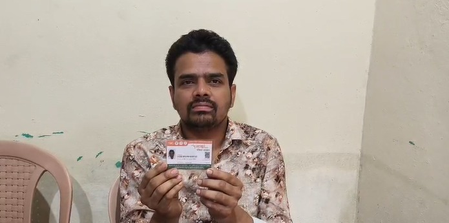
Latur, July 30 (IANS) The Ayushman Bharat Yojana, a flagship health scheme of the Government of India, is bringing transformative change to millions of lives across the country. In Latur, Maharashtra, the scheme has proven particularly beneficial, especially for women, providing them with free and accessible healthcare services.
Built around two core components — Health and Wellness Centres (HWCs) and the Pradhan Mantri Jan Arogya Yojana (PM-JAY) — the scheme offers free health insurance coverage of up to Rs 5 lakh per year to economically weaker families. Beneficiaries can receive treatment at any government or empanelled private hospital across the country.
The scheme has been instrumental in reducing the financial burden of healthcare for the poor, ensuring that access to medical treatment is not hindered by cost. In Latur, many residents are experiencing the positive impact of this initiative firsthand.
Wasim Maniyari, a beneficiary told IANS, “I came here and received free healthcare benefits worth Rs 50,000 under the Ayushman Bharat scheme. It’s a blessing for the poor. I thank PM Modi for this initiative.”
Sonali Gulbile, a social worker and NGO leader in Latur, emphasised the impact on women: “Women here are getting significant benefits from schemes like the PM-JAY. It’s empowering them in many ways. Apart from Ayushman Bharat, people are availing benefits of several other government initiatives. We are grateful to PM Modi for these efforts.”
Launched on September 23, 2018, in Ranchi, Jharkhand, by Prime Minister Narendra Modi, Ayushman Bharat was designed to replace fragmented healthcare delivery with a comprehensive, need-based approach. The scheme provides financial protection to over 10.74 crore poor and vulnerable families, representing nearly 50 crore individuals, or the bottom 40 per cent of India’s population. These households were identified using the Socio-Economic Caste Census (SECC) 2011.
In a major development, the government extended coverage to all senior citizens aged 70 and above on October 29, 2024, regardless of socio-economic status. These individuals are now entitled to free treatment up to Rs 5 lakh per year through Ayushman Vay Vandana cards.
This extension aims to provide equitable healthcare access to India’s elderly population. A unique feature of the scheme is its portability — beneficiaries can seek treatment at any of the 31,466 empanelled hospitals (public or private) across the country, irrespective of their place of residence. Of these, 14,194 are private hospitals, offering a broad range of treatments.
To ensure quality and transparency, the National Health Authority (NHA) has implemented stringent Hospital Empanelment and Management (HEM) Guidelines.
Since the launch of the Vay Vandana extension, over 1.06 lakh claims have already been settled, highlighting the rapid adoption and impact of this progressive healthcare reform.
–IANS
jk/rad



